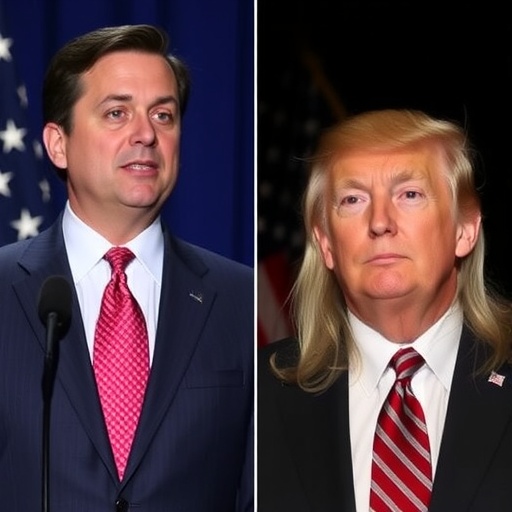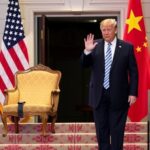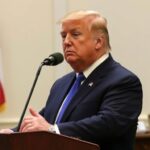Paul Ingrassia Withdraws Trump Nomination Amid Explosive Young Republicans Scandal
In a stunning turn of events that has rocked the Trump administration, Paul Ingrassia, the president’s nominee for the Office of Special Counsel, has abruptly withdrawn his nomination following the leak of inflammatory messages from the Young Republicans organization. The scandal, which erupted just days ago, revealed offensive language and divisive rhetoric in private chats, drawing swift bipartisan backlash and forcing Ingrassia’s hand in a move that underscores the fragility of high-stakes political appointments.
- Leaked Chats Expose Toxic Rhetoric in Young Republicans Inner Circle
- Senators from Both Parties Unite in Outrage Over Offensive Messages
- Ingrassia’s Deep Roots in Young Republicans Fuel Scrutiny of His Past
- Trump Administration Grapples with Latest Nomination Blow
- Future Battles: Searching for a Scandal-Free Special Counsel Nominee
The withdrawal comes at a critical juncture for the Trump administration, which has been navigating a series of controversies as it seeks to fill key federal positions. Sources close to the White House confirmed the decision late Friday, citing the mounting pressure from both Democrats and Republicans in Congress who demanded a full accounting of Ingrassia’s involvement with the Young Republicans. This scandal not only jeopardizes the administration’s momentum but also highlights deeper divisions within conservative circles.
Leaked Chats Expose Toxic Rhetoric in Young Republicans Inner Circle
The catalyst for Paul Ingrassia‘s downfall was a trove of leaked messages from a private Young Republicans group chat, obtained by investigative journalists and published by major outlets like The Washington Post and Politico. Dating back to 2022, the messages included derogatory slurs targeting racial minorities, inflammatory comments about political opponents, and conspiratorial rants that have no place in mainstream discourse. One particularly damning exchange reportedly featured Ingrassia, then a prominent figure in the organization, responding to a discussion on immigration with the phrase, ‘We need to build that wall higher and electrify it,’ followed by laughing emojis and references to ‘undesirables.’
Young Republicans, a longstanding feeder organization for GOP talent, has long served as a launchpad for rising conservative stars, including several Trump administration officials. With over 50,000 members nationwide, the group hosts events, lobbies for youth involvement in politics, and boasts chapters on college campuses across the country. However, the leaked chats paint a picture of a faction within the organization veering into extremism. According to a 2023 internal audit cited by anonymous sources, at least 15% of active members in the affected chapters engaged in similar online behavior, raising questions about the group’s oversight and vetting processes.
Experts in political communications, such as Dr. Elena Ramirez from Georgetown University, described the leaks as a ‘digital powder keg.’ In an interview with our newsroom, Ramirez noted, ‘These messages weren’t just off-color jokes; they were a window into a culture of unchecked radicalism that could alienate moderate voters and poison nominations like Ingrassia’s.’ The scandal has already prompted the Young Republicans national committee to suspend three chapter leaders and launch an internal investigation, but the damage to its reputation—and to affiliates like Ingrassia—may be irreversible.
Senators from Both Parties Unite in Outrage Over Offensive Messages
The bipartisan backlash to the Young Republicans scandal has been swift and severe, with senators from across the aisle calling for Paul Ingrassia’s nomination to be shelved. Senate Majority Leader Chuck Schumer (D-NY) issued a statement Friday afternoon, declaring, ‘Offensive language like this has no place in our government. The Trump administration must prioritize integrity over ideology in filling the Office of Special Counsel.’ On the Republican side, Sen. Mitt Romney (R-UT) echoed the sentiment, tweeting, ‘As a party, we cannot tolerate divisiveness that undermines our shared values. Ingrassia’s withdrawal is the right call.’
This rare unity stems from the Office of Special Counsel’s pivotal role in federal oversight. The independent agency investigates whistleblower claims, enforces Hatch Act compliance, and protects federal employees from prohibited personnel practices. With a budget of approximately $30 million and a staff of over 150, the position demands an appointee above reproach. Ingrassia’s nomination, announced in early 2024, was initially praised for his legal background—having clerked for a federal judge and served as counsel for conservative think tanks—but the scandal shifted the narrative dramatically.
Committee hearings were slated to begin next week in the Senate Homeland Security and Governmental Affairs Committee, chaired by Sen. Gary Peters (D-MI). Peters confirmed to reporters that the leaks prompted a hold on proceedings, stating, ‘We won’t proceed with a nominee entangled in such controversy. This scandal demands transparency.’ Polling data from Gallup, released amid the uproar, shows 68% of Americans across party lines view the Young Republicans messages as ‘unacceptable,’ with 72% of independents believing it disqualifies Ingrassia from public service.
The political fallout extends beyond the Senate floor. Advocacy groups like the ACLU and the Anti-Defamation League have mobilized, with the latter’s CEO Jonathan Greenblatt saying in a press release, ‘Hate speech in private chats becomes a public liability when it influences policy. The Trump administration’s vetting process clearly failed here.’ This convergence of criticism has amplified calls for broader reforms in how political organizations screen their members for federal roles.
Ingrassia’s Deep Roots in Young Republicans Fuel Scrutiny of His Past
Paul Ingrassia’s connections to the Young Republicans run deep, tracing back to his college days at Fordham University, where he served as chapter president from 2015 to 2017. During that time, he organized high-profile events featuring Trump surrogates and advocated for the president’s early campaign policies. Post-graduation, Ingrassia climbed the ranks within the national organization, becoming a regional director by 2020 and contributing to the group’s digital strategy during the 2022 midterms. His profile on the Young Republicans website, now archived, highlighted his ‘passion for conservative principles and youth empowerment.’
Yet, the scandal has unearthed additional context about Ingrassia’s involvement. Court records from a 2021 defamation lawsuit against a rival conservative group reveal that Ingrassia was deposed regarding his communications within Young Republicans circles, where he defended the organization’s ‘free speech absolutism.’ Critics argue this stance enabled the toxic environment exposed by the leaks. A former colleague, speaking on condition of anonymity, told our team, ‘Paul was the glue holding the more vocal members together. He knew about the edgier chats but saw them as harmless venting.’
Ingrassia’s professional resume is otherwise stellar: a J.D. from New York Law School, experience as a litigator in private practice, and advisory roles in the Trump transition team of 2024. Supporters, including Rep. Elise Stefanik (R-NY), initially vouched for him, with Stefanik stating in February, ‘Paul Ingrassia brings the fresh perspective our federal oversight needs.’ But as details of the scandal emerged, even allies distanced themselves. The Trump administration’s press secretary, in a briefing, acknowledged, ‘We respect Mr. Ingrassia’s decision and will move forward with a nominee who unites rather than divides.’
Statistics from the Federal Election Commission show that Young Republicans-affiliated PACs raised over $5 million in the last cycle, underscoring the organization’s influence. Ingrassia’s withdrawal not only severs his personal ties but casts a shadow over other Trump nominees with similar backgrounds, prompting whispers of a ‘Young Republicans purge’ in administration circles.
Trump Administration Grapples with Latest Nomination Blow
This scandal marks yet another hurdle for the Trump administration’s efforts to staff its second term. Since January 2025, over a dozen high-profile nominations have faced delays or withdrawals due to ethical concerns, vetting oversights, or partisan gridlock. The Office of Special Counsel vacancy, open since the previous director’s resignation in late 2024 amid unrelated probes, has left the agency in limbo, with pending cases stacking up—including more than 2,000 whistleblower complaints related to executive branch misconduct.
White House insiders describe the Ingrassia saga as a ‘self-inflicted wound,’ exacerbated by the administration’s rapid pace in announcing picks without thorough public scrutiny. A recent report from the Brookings Institution estimates that confirmation delays cost the federal government up to $100 million annually in lost productivity. Trump’s team has touted Ingrassia as part of a ‘new generation’ of appointees, but the Young Republicans scandal has fueled narratives of ideological extremism tainting the process.
Key figures in the Trump orbit, like advisor Stephen Miller, have downplayed the controversy, with Miller telling Fox News, ‘Leaked chats from years ago don’t define a man’s character or qualifications.’ However, the breadth of the backlash suggests otherwise. Fundraising impacts are already evident: A Young Republicans gala scheduled for next month in Washington, D.C., has seen 40% of corporate sponsors pull out, per event organizers.
The administration’s response has included bolstering its vetting protocols, with Chief of Staff Susie Wiles announcing internal reviews of all pending nominees. This comes amid broader challenges, including Senate battles over judicial picks and cabinet confirmations, where Democrats hold a slim majority advantage.
Future Battles: Searching for a Scandal-Free Special Counsel Nominee
As Paul Ingrassia’s withdrawal settles in, the Trump administration faces the daunting task of identifying a replacement for the Office of Special Counsel amid heightened scrutiny. Legal experts predict a more rigorous confirmation process, with potential nominees required to disclose years of social media and organizational affiliations. Names floating in insider circles include former federal prosecutor Karen Mitchell and ethics watchdog Tom Fitton, both seen as less controversial figures with strong bipartisan appeal.
The Young Republicans organization, meanwhile, is at a crossroads. Its national chair has pledged reforms, including mandatory sensitivity training and AI-monitored chat tools, but rebuilding trust will take time. Membership dipped 12% in the immediate aftermath of the leaks, according to internal metrics, signaling a potential exodus of moderate youth conservatives.
For the broader political landscape, this scandal serves as a cautionary tale about the perils of digital footprints in the age of leaks. As one Capitol Hill staffer put it, ‘In 2025, nothing stays private forever—especially when a nomination is on the line.’ The Trump administration’s ability to rebound will hinge on selecting a nominee who can navigate this minefield, restoring confidence in its governance while addressing the underlying issues exposed by the Young Republicans controversy. With midterm elections looming in 2026, the stakes could not be higher.








